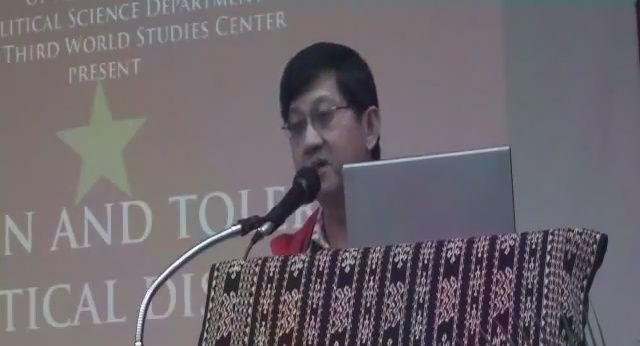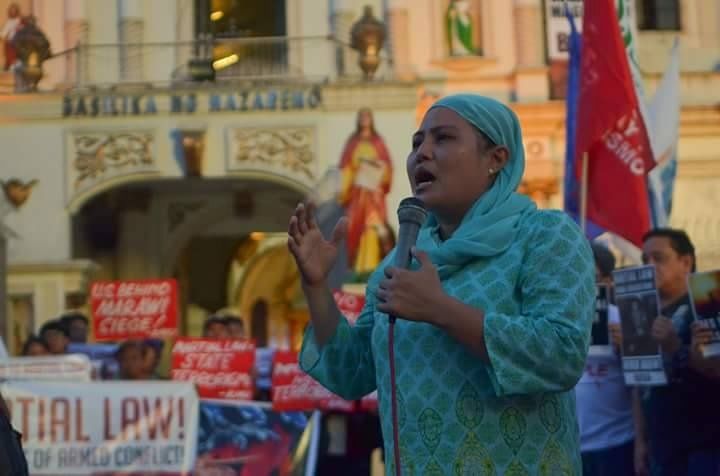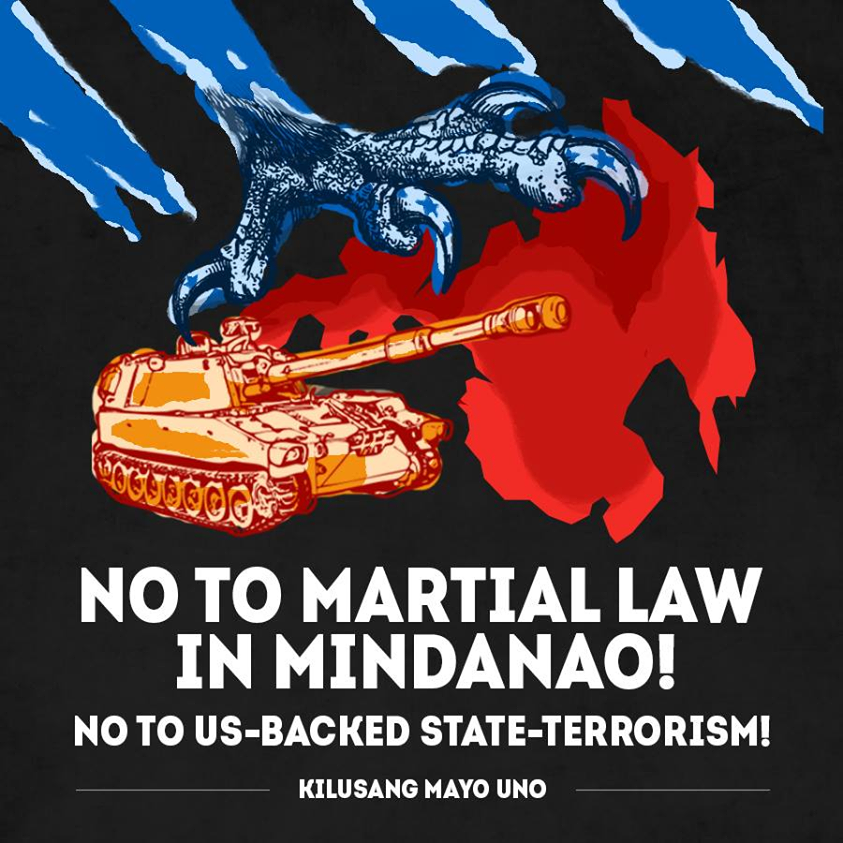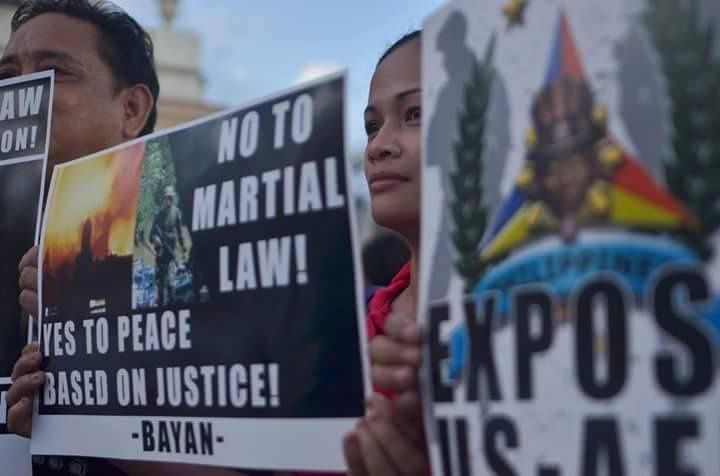Activists
Protesters with BAYAN, the New Patriotic Alliance, denounce the martial law declaration in Mindanao. | Photo: Carlo Manalansan
The people of the Philippines are facing an uncertain future after President Rodrigo Roa Duterte’s declaration of martial law in the Mindanao province, population 22 million, following a flare-up of violence between the Armed Forces of the Philippines and the small Islamist Maute militant group. Increasingly, mass movements of poor people across the Southeast Asian nation are feeling that the brash, and unpredictable president is attempting to cast himself in the mold of a dictator, the head of a military junta, on the flimsy pretext of the Maute group’s “terrorist threat.”
“Declaring martial law all over Mindanao because of turmoil and clashes in one of its cities is definitely an overreaction,” Professor Roland Simbulan of the University of the Philippines, Manila told teleSUR, pointing to Duterte’s earlier threats to declare martial law as part of his bloody anti-drug campaign. Simbulan is a noted scholar of Philippine-U.S. relations, and of the U.S.-funded militarization of the country in particular.
“Now, the Maute group in one city in Mindanao has given him an excuse to use his martial law powers,” Simbulan added. “In the United States, even the most serious national security threats such as the 9/11 attacks against the very centers of political and economic power in the U.S. didn’t merit such a declaration to deal with the situation.”
Suara Bangsamoro is a Muslim-leftist group in Mindanao that is fighting for the Moro people’s right to self-determination, in unity with the broader nationwide fight versus poverty and imperialism. It has blamed the current spate of violence on the government’s bad faith negotiations with insurgent forces on the island, such as the Moro Islamic Liberation Front, or MILF – as well as the government’s use of violence as the remedy for social unrest rooted in poverty and semifeudal conditions.
“For as long as the government fails to address the Moro people’s basic problems of landlessness, pervasive poverty, monopoly of land ownership by Moro and non-Moro ruling elite, large-scale plantations and mining operations by foreign corporations, and their local partners, government neglect of basic social services, lack of job opportunities, etc., the peace crisis situation in Muslim Mindanao and the whole of the Philippines will persist,“ said Suara Bangsamoro chair Jerome Succor Aba in an interview with Manila Today.
While the measures are meant to last only 60 days – and are ostensibly aimed at preventing the spread of “extremism” across the poverty-stricken island – the presidential Malacañang Palace has sent conflicting signals about its intentions. Almost immediately, following the issuance of the order, Duterte floated the idea of spreading martial rule across the entire country, possibly for up to a year.
The people of the Philippines know very well what martial law entails, having lived through it under dictator Ferdinand Marcos, whose own period of military rule lasted from 1972 to 1981.
“First and foremost, it will result in gross human rights violations by Philippine state forces, including violations to international humanitarian law,” Bernadette Ellorin of BAYAN USA — the U.S. branch of the New Patriotic Alliance of the Philippines — told teleSUR. During the Marcos period of martial law, government brutality became the norm.

Professor Roland Simbulan | Photo: Third World Studies Center
“With martial law, Duterte has further emboldened the AFP to intensify its campaign of extrajudicial killings, abductions, torture, indiscriminate firing, military occupation of communities, forcible evacuation and hamletting of communities, aerial bombings, and a myriad of military abuses,” the Communist Party of the Philippines said in a statement Wednesday.
“Duterte is playing with fire if he thinks it (martial law) is a solution to Philippine problems,” Jose Maria Sison, founder of the Communist Party of the Philippines, added in a separate interview.
The timing of the declaration is also deeply foreboding for the country’s mass movements and Marxist-Leninist forces, as it comes within the same week as the fifth round of peace talks between the government of the Philippines and the New People’s Army guerrillas, the Communist Party of the Philippines cadre, and the National Democratic Forces movement allies. The talks will take place in the Netherlands May 27-June 1. Duterte had previously shown a good measure of flexibility toward the demands of mass movement groups, both during his time as Mayor of Davao City, and as president.
However, signs are appearing that his limited peace moves toward the NPA, CPP, and NDF will no longer be tolerated by U.S.-backed oligarchs or military top brass.
“The peace talks were established in 1992 with the objective of addressing the roots of the armed conflict, which continue to crush poverty, landlessness, and joblessness for the vast majority of the Filipino people,” Ellorin said. “They remain a legitimate and important arena to struggle for pro-people reforms, such as the social and economic reforms being discussed now, including free land distribution and national industrialization.”
“Now that the peace talks are at the stage where the interests of the oligarchs will be affected in the discussion and drafting of the Comprehensive Agreement on Social and Economic Reforms, CASER, we know that the oligarchs who helped Duterte during elections will pressure him to take a different stand,” Amirah Ali Lidasan, a Moro organizer and former chairperson of Suara Bangsamoro, explained to teleSUR.

Former chairperson of Suara Bangsamoro, Amirah Ali Lidasan, takes part in a Wednesday protest against the martial law declaration. | Photo: Carlo Manalansan
Indeed, the notoriously right-wing militarist Defense Secretary Delfin Lorenzana let slip in an interview Wednesday that the sweeping martial law order would be used to pursue an offensive against NPA guerillas, who are collecting revolutionary taxes throughout Southern Mindanao, likely derailing peace talks.
“Because Lorenzana included the NPA ‘extortion’ as one of the reasons for the declaration of martial law, then we will expect a heightened attack versus NPA guerillas such as those that happened when President Duterte called for military airstrikes in February and April this year,” Lidasan said. “But this would also mean aerial and ground assaults in NPA areas in Southern Mindanao, which would affect hundreds of people in the region.”

Professor Simbulan agrees, pointing to the widespread corruption and indiscipline within the Armed Forces of the Philippines and the Phillipine National Police. “We may see massive abuses against the marginalized communities which are being protected by the revolutionary forces of the CPP/NPA/NDF,” he said.
In a statement released Thursday by the Federation of Agricultural Workers or UMA Pilipinas, UMA Secretary-General Danilo “Ka Daning” Ramos explained, “martial law will only further suppress the labor, land and human rights of agricultural workers and of the Filipino people.”
“All organizers and members of agricultural workers in Mindanao are at risk of being attacked by state security forces as Defense Chief Lorenzana branded the place as a haven of the New Peoples’ Army,” the statement added.
Read more at : http://www.telesurtv.net/english/analysis/Duterte-Invokes-Martial-Law-Mass-Movements-Communists-Muslims-Promise-to-Fight-Back-20170524-0045.html






